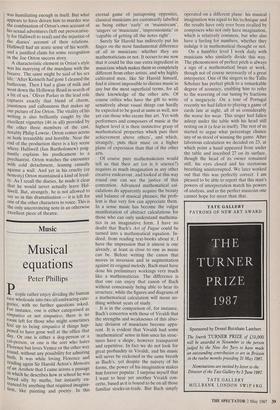Music
Musical equations
Peter Phillips
People rather enjoy dividing the human race wholesale into two all-embracing cate- gories, with no further questions asked. For instance, one is either categorised as simpatico or not simpatico; there is no room left for those who might sometimes feel up to being simpatico if things hap- pened to have gone well at the office that day. Or one is either a dog-person or a cat-person, or one is the sort who hates Florence but loves Venice or the other way round, without any possibility for admiring both. It was while loving Florence and reading again Sir Harold Acton's Memoirs of an Aesthete that I came across a passage in which he describes how at school he was bored silly by maths, but instantly en- tranced by anything that required imagina- tion, like painting and poetry. In this
eternal game of juxtaposing opposites, classical musicians are customarily labelled as being either 'early' or 'mainstream', `singers' or 'musicians', 'impressionistic' or `capable of getting all the notes right'.
Surely Sir Harold has indirectly put his finger on the most fundamental difference of all in musicians: whether they are mathematicians or not. It occurs to me now that it could be this one extra ingredient in musicians which makes them so completely different from other artists, and why highly cultivated men, like Sir Harold himself, find it almost impossible to discuss music in any but the most superficial terms, for all their knowledge of the other arts. Of course critics who have the gift to write sensitively about visual things can hardly be expected to be good at sums as well, nor yet can those who create fine art. Yet with performers and composers of music at the highest level it is their instinctive grasp of mathematical properties which puts their achievement above others', and which, strangely, puts their muse on a higher plane of expression than that of the other arts.
Of course pure mathematicians would tell us that their art (or is it science?) requires as much imagination as any other creative endeavour, and looked at this way round one can see the justice of that contention. Advanced mathematical cal- culations do apparently acquire the beauty and balance of musical phrases; the prob- lem is that very few can appreciate them. In a sense music has become the vulgar manifestation of abstract calculations for those who can only understand mathema- tics in an imaginative form. I have no doubt that Bach's Art of Fugue could be turned into a mathematical equation. In- deed, from reading text-books about it, I have the impression that it almost is one already, at least as close to one as music can be. Before writing the canon that moves in inversion and in augmentation against its original melody, Bach must have done his preliminary workings very much like a mathematician. The difference is that one can enjoy that canon of Bach without consciously being able to hear its structure, while the figures and diagrams of a mathematical calculation will mean no- thing without years of study.
It is in the comparison of, for instance, Bach's concertos with those of Vivaldi that the strengths and weaknesses of this abso- lute division of musicians become appa- rent. It is evident that Vivaldi had some `mathematical' sense in him since his struc- tures have a shape, however transparent and repetitive. In fact we do not look for great profundity in Vivaldi, and his music will never be reckoned in the same breath as Bach's, yet despite the naivety of his forms, the power of his imagination makes him forever popular. I surprise myself that I want to hear yet another Vivaldi con- certo, based as it is bound to be on all those familiar stocks-in-trade. But Bach simply
operated on a different plane: his musical imagination was equal to his technique and the results have only ever been rivalled by composers who not only have imagination, which is relatively common, but who also have a feeling for numbers, whether they indulge it in mathematical thought or not.
On a humbler level I work daily with musicians who similarly divide this way. The phenomenon of perfect pitch is always a sign of a mathematical brain at work, though not of course necessarily of a great interpreter. One of the singers in the Tallis Scholars has perfect pitch to a remarkable degree of accuracy, enabling him to refer to the wavering of our tuning by fractions of a megacycle. On a tour of Portugal recently we had fallen to playing a game of cards late at night, all of us considerably the worse for wear. This singer had fallen asleep under the table with his head still resting on it (a feat in itself). The rest of us started to argue what percentage chance any of us stood of winning the game. After laborious calculation we decided on 23, at which point a hand appeared from under the table and inscribed 27 on its surface, though the head of its owner remained still, his eyes closed and his stertorous breathing uninterrupted. We later worked out that this was perfectly correct. I am pleased to be able to report that this man's powers of interpretation match his powers of analysis, and in the perfect musician one cannot hope for more than that.


















































 Previous page
Previous page